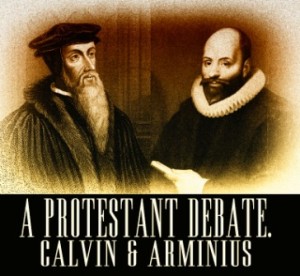There is a reason that taboo topics are taboo. People are so sensitive about them, they are so dear to their heart, that when somebody disagrees with them, they behave comparably to children. Adults essentially begin to throw temper tantrums. They also begin to condemn each other over issues for which, people should not be condemned. People are taught from childhood that everybody who holds to a particular view is wrong. With that ingrained in their mind, there is little room for edification or growth. I attempt to expose 5 disagreements Christians shouldn’t condemn each other over. Certainly there are more issues than five. But these are the main ones which I have encountered.
1 – Election
 Of course, I am specifically referring to the dispute between Calvinism and Arminianism. What is the nature of God’s election? What is the nature of the free will of man? What is the nature of predestination? These are all very interesting questions, with very interesting implications, and I think there are strong biblical cases that can be made for both sides. However, people are so passionate about their answers and the implications that they begin to condemn each other over this.
Of course, I am specifically referring to the dispute between Calvinism and Arminianism. What is the nature of God’s election? What is the nature of the free will of man? What is the nature of predestination? These are all very interesting questions, with very interesting implications, and I think there are strong biblical cases that can be made for both sides. However, people are so passionate about their answers and the implications that they begin to condemn each other over this.
The problem, though, is obviously that this is not an issue relevant to salvation. One can believe in free will, and still believe that salvation comes by grace through faith, and still believe in the sacrifice of Christ. One can reject free will and believe the same thing. There is nothing, coming from either side, that would leave them outside of the gospel of Christ. So, I am persuaded that when they condemn each other, they are doing it purely out of emotional reasons, rather than rational or biblical reasons. If you feel too strongly about this debate, then I recommend that you just do not talk about it altogether, lest you condemn your brothers in Christ.
2 – Creation
 Seeing the numerous interpretations of Genesis 1, going back even as far as Saint Augustine, this is certainly a very interesting topic. How did God create the world? Are the days in Genesis 1 long, but finite periods of time? Are they 24 hour periods? Are they figurative? Of course, this relates to the question of modern science as well. Should we just ignore the natural world (which God created)? Does modern science make sense in light of the Scripture?
Seeing the numerous interpretations of Genesis 1, going back even as far as Saint Augustine, this is certainly a very interesting topic. How did God create the world? Are the days in Genesis 1 long, but finite periods of time? Are they 24 hour periods? Are they figurative? Of course, this relates to the question of modern science as well. Should we just ignore the natural world (which God created)? Does modern science make sense in light of the Scripture?
This used to be one of my favorite biblical questions, until I noticed that people condemn each other over it. Many Young Earth Creationists will condemn everybody who believes in an old earth.
They defend this, usually, by saying that the old earth view compromises the doctrine of ‘no death before sin,’ (which I looked at thoroughly here), and therefore, also denies original sin, and the need for a Savior. Now even if we grant that the old earth view denies the story of original sin, does not mean that they deny their own sin. One can acknowledge that they are sinners, without having any idea how they became a sinner. The distinction between young earth and old earth creationism is an interesting one, but there is nothing within that should cause somebody to condemn another person.
3 – End Times Doctrine
 Who are the elders in Revelations? Should Revelations be taken as actual, literal events? Should these events be taken as futuristic, or historical? Many eminent scholars and theologians have strived to answer these question, but either way, this is something that the Scripture is not very clear about. God revealed to us what we needed to know. But it is not clear enough for most to be firmly grounded in any particular stance.
Who are the elders in Revelations? Should Revelations be taken as actual, literal events? Should these events be taken as futuristic, or historical? Many eminent scholars and theologians have strived to answer these question, but either way, this is something that the Scripture is not very clear about. God revealed to us what we needed to know. But it is not clear enough for most to be firmly grounded in any particular stance.
But those who do ground themselves in a particular stance may condemn everybody who disagrees. Of course, this is an emotional reaction. There is nothing within eschatology that should condemn a person. Most Christians come to learn about the rapture and other related issues after being born again.
4 – Tongues
 Ever since the early church, the question of tongues has been apparent. Tongues were in the Pagan religion in Corinth, which is why Paul the apostle was forced to rebuke the church for their excessive tongues and lack of edification (1 Cor 14). When I say tongues, I do not mean people who learn another human language (such as at Pentecost). I mean the ecstatic tongues apparent in many charismatic churches. It may be argued that this is, or was, a spiritual gift, and I do not see any reason to condemn people who hold to this.
Ever since the early church, the question of tongues has been apparent. Tongues were in the Pagan religion in Corinth, which is why Paul the apostle was forced to rebuke the church for their excessive tongues and lack of edification (1 Cor 14). When I say tongues, I do not mean people who learn another human language (such as at Pentecost). I mean the ecstatic tongues apparent in many charismatic churches. It may be argued that this is, or was, a spiritual gift, and I do not see any reason to condemn people who hold to this.
This is something that even John MacArthur pointed out. Not everybody who takes one particular stance on this issue is outside of the body of Christ. Even Dr John Piper claims to speak in ecstatic tongues. The problem, though, is that some of the more radical groups who believe in ecstatic tongues end up condemning everybody who disagrees. Of course, as Paul said, “I would rather speak 5 words in my mind, than 1000 in tongues.” He contrasts the usefulness of prophecy, against the uselessness of angelic tongues (1 Cor 14), and says that while he wishes everybody in the body of Christ could speak in tongues, there are greater callings. Some may do it, some may not. Paul certainly did not condemn others over this.
5 – Baptismal Formula
 When I say this, I do not mean baptism in general. Most Christians probably do hold that water baptism is essential for salvation. I hold that water baptism is essential for obedience. With that in mind, the baptismal formula is the words that one recites over the baptismal tank before being baptized. What should the baptizer say? What did the original apostles say when they baptized somebody? What did Jesus command that we say? Very interesting questions. But they are irrelevant to salvation.
When I say this, I do not mean baptism in general. Most Christians probably do hold that water baptism is essential for salvation. I hold that water baptism is essential for obedience. With that in mind, the baptismal formula is the words that one recites over the baptismal tank before being baptized. What should the baptizer say? What did the original apostles say when they baptized somebody? What did Jesus command that we say? Very interesting questions. But they are irrelevant to salvation.
I think that the apostles probably did not say anything prior to baptizing somebody. After all, in the book of Acts, there is nothing formulaic… there is not a set creed that they repeat again and again. They will say, “in the name of Jesus Christ,” or “In the name of the Lord Jesus…” If this were a baptismal formula, it would be formulaic. Indeed, Christ said to baptize… “in the name of the Father, Son, Holy Spirit.” Since these are so different, I think one can conclude that these are not supposed to be formulaic.
Instead, they are figures of speech. The term, “in the name of Jesus,” is comparable to the term, “in the name of the law.” It is just a figure of speech representing authority. It may also mean that we are conformed to the image of the Son (Romans 8:29). But either way, this should not be taken as a matter of salvation. Water baptism has nothing to do with chants, or the words that one recites, or magic formulas. We ought not condemn each other over this.
Can you think of more? Leave a comment!
If you would like to discuss further, come join our Theology Discussion Group